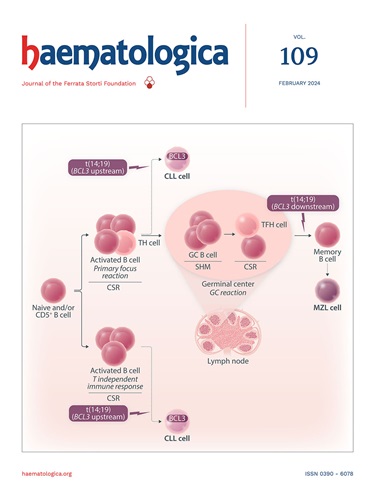早期细胞因子和趋化因子信号塑造双特异性接合分泌T细胞的抗aml活性。
IF 7.9
1区 医学
Q1 HEMATOLOGY
引用次数: 0
摘要
免疫疗法,包括细胞疗法,是有效的抗癌药物。然而,细胞产物的持久性可能受到限制,功能活动持续时间短,导致疾病复发。多种制造方案用于产生治疗性工程t细胞;这些不同的技术用于t细胞分离、激活、基因修饰和其他方法学。我们试图确定预选如何影响T细胞的表型,从而分泌CD123xCD3双特异性接触器(engt)。这些细胞被设计用于治疗急性髓性白血病(AML)。我们评估了t细胞选择对转导效率、t细胞活化、短期和长期抗aml细胞毒性以及基因转录的影响。在短期试验中,未选择的CD4、CD8和CD4/CD8预选择的ENG-T细胞在t细胞亚群成分、等效激活和等效细胞毒性方面存在微小差异。虽然未选择和CD4/CD8选择的ENG-T细胞在靶细胞暴露之前具有相同的CD4:CD8组成,但体外连续刺激表明CD4/CD8预选支持ENG-T细胞的存活和长期活性。同样,CD4和CD4/CD8预先选择的ENG-T细胞显示出优越的抗肿瘤功效,延长了AML异种移植小鼠的生存期。未选择的ENG-T细胞在早期制造过程中暴露于细胞因子,细胞内炎症途径的上调。这种早期激活可能是长期观察到的功能差异的基础。从储存的患者生物标本中预先选择T细胞减少了原始细胞污染,暴露于炎症细胞因子,并可能改善T细胞在制造过程中的扩增。应该继续进行t细胞产品的预选,以提高临床细胞治疗的质量。本文章由计算机程序翻译,如有差异,请以英文原文为准。
Early cytokine and chemokine signals shape the anti-AML activity of bispecific engager-secreting T cells.
Immunotherapies, including cell therapies, are effective anti-cancer agents. However, cellular product persistence can be limiting with short functional duration of activity contributing to disease relapse. A variety of manufacturing protocols are used to generate therapeutic engineered T-cells; these differ in techniques used for T-cell isolation, activation, genetic modification, and other methodology. We sought to determine how preselection affected the phenotype of T cells engineered to secrete a CD123xCD3 bispecific engager (ENG-T). These cells were designed to treat acute myeloid leukemia (AML). We evaluated the effect of T-cell selection on transduction efficiency, T-cell activation, short- and long-term anti-AML cytotoxicity, and gene transcription. Unselected, CD4, CD8, and CD4/CD8 pre-selected ENG-T cells have minor differences in T-cell subset components, equivalent activation, and equal cytotoxicity in short-term assays. While unselected and CD4/CD8-selected ENG-T cells have identical CD4:CD8 composition prior to target cell exposure, serial stimulation in vitro showed CD4/CD8 pre-selection supports ENG-T cell survival and long-term activity. Likewise, CD4 and CD4/CD8 pre-selected ENG-T cells display superior anti-tumor efficacy and prolong murine survival in AML xenografts. Unselected ENG-T cells are exposed to cytokines during early manufacture that imprint upregulation of intracellular inflammatory pathways. This early activation likely underpins long-term observed functional differences. Pre-selection of T cells from banked patient biospecimens decreased blast contamination, exposure to inflammatory cytokines, and may improve T-cell expansion during manufacture. Pre-selection of T-cell products should continue to be performed to enhance the quality of clinical cellular therapeutics.
求助全文
通过发布文献求助,成功后即可免费获取论文全文。
去求助
来源期刊

Haematologica
医学-血液学
CiteScore
14.10
自引率
2.00%
发文量
349
审稿时长
3-6 weeks
期刊介绍:
Haematologica is a journal that publishes articles within the broad field of hematology. It reports on novel findings in basic, clinical, and translational research.
Scope:
The scope of the journal includes reporting novel research results that:
Have a significant impact on understanding normal hematology or the development of hematological diseases.
Are likely to bring important changes to the diagnosis or treatment of hematological diseases.
 求助内容:
求助内容: 应助结果提醒方式:
应助结果提醒方式:


